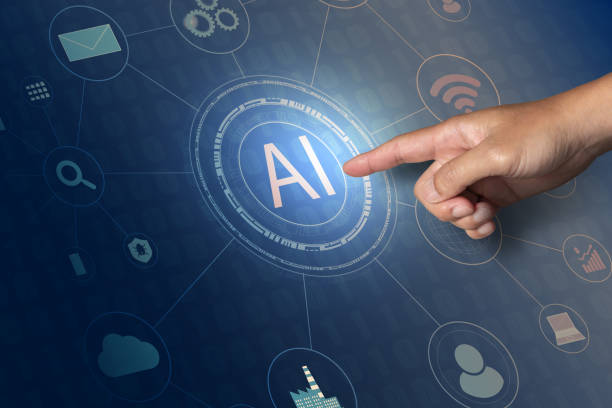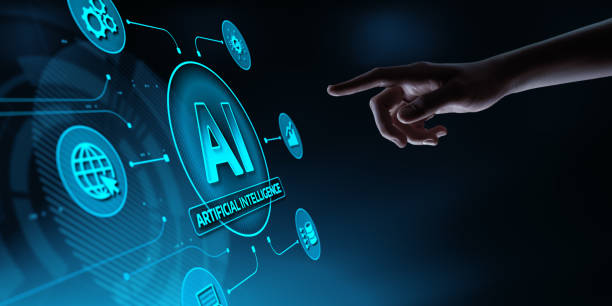What is Artificial Intelligence and How Does it Work?
Artificial intelligence (#AI) is a branch of computer science that deals with building machines that are capable of performing tasks that usually require human intelligence.
These tasks include learning, problem-solving, pattern recognition, natural language understanding, and decision-making.
Artificial intelligence tries to simulate these capabilities in machines by using algorithms and mathematical models.
The core of artificial intelligence is based on algorithms.
Algorithms are a set of instructions that tell a computer how to solve a problem.
In the field of #Artificial_Intelligence, algorithms are often used to learn from data and predict outcomes.
In general, artificial intelligence allows machines to learn from experience, adjust to new inputs, and perform human-like tasks.
There are different types of artificial intelligence, from simple systems that perform specific tasks to complex systems that are capable of learning and reasoning.
Machine Learning is an important subfield of artificial intelligence that allows machines to learn from data without explicit programming.
[Deep Learning](https://fa.wikipedia.org/wiki/%DB%8C%D8%A7%D8%AF%DA%AF%DB%8C%D8%B1%DB%8C_%D8%B9%D9%85%DB%8C%D9%82) is another branch of machine learning that uses deep neural networks to analyze data and extract patterns.
With the advancement of technology, artificial intelligence is playing an increasingly important role in our lives and is used in various fields such as medicine, finance, transportation, and entertainment.
Research shows that 80% of customers trust companies with professional websites more. Does your current website earn this trust?
Solve the problem of customer distrust and weak online image forever with Rasaweb’s corporate website design services!
✅ Create a professional image and increase customer trust
✅ Attract more sales leads and grow your business
⚡ Get a free consultation
History of Artificial Intelligence – From Dream to Reality
The history of artificial intelligence dates back to the 1950s, when researchers first began exploring the possibility of building machines that could think like humans.
[Alan Turing](https://fa.wikipedia.org/wiki/%D8%A2%D9%84%D9%86_%D8%AA%D9%88%D8%B1%DB%8C%D9%86%DA%AF), one of the pioneers in this field, presented a criterion for measuring the intelligence of machines by proposing the Turing test.
In the early decades, progress was slow, but with the development of new algorithms and increased computing power, artificial intelligence gradually became a reality.
The 1980s saw the emergence of expert systems designed to solve specific problems in specialized fields.
However, these systems had their limitations and could not be widely used.
In the 1990s, with the development of machine learning algorithms and increased access to data, artificial intelligence regained attention.
Today, artificial intelligence is used in many fields and is constantly advancing.
From self-driving cars to virtual assistants, artificial intelligence is rapidly changing our world.
The ultimate goal of artificial intelligence is to create machines that can think, learn, and make decisions like humans.
This goal is still far away, but recent advances show that artificial intelligence has great potential to change the future.
The use of artificial intelligence in improving business processes and increasing productivity is also increasing day by day.
Applications of Artificial Intelligence in Today’s World
Artificial intelligence is used in various fields, including medicine, finance, transportation, education, and entertainment.
In medicine, artificial intelligence can help diagnose diseases, develop drugs, and provide personalized treatments.
In finance, artificial intelligence can be used to detect fraud, manage risk, and provide investment advice.
In transportation, artificial intelligence can be used to develop self-driving cars and optimize transportation routes.
In education, artificial intelligence can be used to provide personalized training and assess student performance.
In entertainment, artificial intelligence can be used to produce creative content and provide interactive experiences.
In fact, artificial intelligence is rapidly penetrating all aspects of our lives and has great potential to improve the quality of human life.
One of the fascinating applications of #Artificial Intelligence is its use in the development of smart cities.
Using sensors and smart algorithms, cities can optimize energy consumption, manage traffic, and provide better services to citizens.
For example, intelligent traffic management systems can analyze traffic data in real-time, suggest optimal routes for drivers, and prevent traffic jams.
Also, intelligent energy management systems can predict energy consumption and manage energy resources more effectively and prevent energy waste.
| Application | Description |
|---|---|
| Medicine | Diagnosis of diseases, drug development, provision of personalized treatments |
| Finance | Fraud detection, risk management, provision of investment advice |
| Transportation | Development of self-driving cars, optimization of transportation routes |
| Education | Providing personalized training, evaluating student performance |
| Entertainment | Production of creative content, provision of interactive experiences |
Click here to preview your posts with PRO themes ››
Challenges and Limitations of Artificial Intelligence
Despite significant advances in the field of artificial intelligence, there are still many challenges and limitations.
One of the main challenges is the lack of training data.
For an artificial intelligence system to work well, it needs a large amount of training data.
Also, artificial intelligence still faces difficulties in understanding natural language and logical reasoning.
Another important challenge is the ethical issues related to artificial intelligence.
With the development of artificial intelligence systems, questions arise about accountability, privacy, and security.
For example, if a self-driving car causes an accident, who will be responsible? Or how can we prevent the misuse of artificial intelligence for illegal purposes?
Another issue that needs to be addressed is the impact of artificial intelligence on the job market.
With the automation of many tasks, many jobs may be lost.
To address this challenge, we need to design new training programs to help people learn new skills and prepare for new jobs.
Artificial intelligence has great potential to improve our lives, but it must be developed carefully and responsibly.
[The future of artificial intelligence](https://www.irantalent.com/blog/%D9%85%D9%82%D8%A7%D9%84%D9%87-%D8%B1%D9%88%D9%86%D8%AF-%D9%87%D9%88%D8%B4-%D9%85%D8%B5%D9%86%D9%88%D8%B9%DB%8C-%D8%AF%D8%B1-%D8%A7%DB%8C%D8%B1%D8%A7%D9%86/) depends on responding to these challenges and using this technology responsibly.
Is your online sales not as expected? Solve the problem of low sales and poor user experience forever with Rasaweb!
✅ Increase the conversion rate of visitors to customers
✅ Create an enjoyable user experience and increase customer trust
⚡ Act now to receive a free consultation!
The Future of Artificial Intelligence – What to Expect?
The future of artificial intelligence looks very bright.
With the advancement of technology, artificial intelligence will play an increasingly important role in our lives.
It is expected that in the future, artificial intelligence systems will be able to perform more complex tasks and be used in new fields.
One of the important trends in the field of artificial intelligence is the development of artificial general intelligence (AGI).
Artificial general intelligence refers to systems that are capable of performing any task that a human can perform.
Achieving artificial general intelligence is an ambitious goal, but many researchers believe that it will eventually be possible.
Another important trend is the development of explainable artificial intelligence (XAI).
Explainable artificial intelligence refers to systems that are able to explain how they make decisions.
This is very important for increasing trust in artificial intelligence and using it in sensitive areas such as medicine and law.
Finally, artificial intelligence has great potential to change our world, but it must be developed carefully and responsibly.
Given these points, it can be said that artificial intelligence will play a significant role in future developments, and we must be prepared to face these developments.
Machine Learning – The Beating Heart of Artificial Intelligence
Machine Learning is one of the most important subfields of artificial intelligence.
In machine learning, machines are given the ability to learn from data without explicit programming.
This is possible by using different machine learning algorithms.
Machine learning algorithms allow machines to identify patterns in data and use these patterns to predict new outcomes.
There are different types of machine learning algorithms, including supervised learning, unsupervised learning, and reinforcement learning.
Supervised Learning refers to algorithms that are trained using labeled data.
In this type of learning, machines are provided with data that has correct answers.
Machine learning algorithms use this data to learn patterns and then use these patterns to predict new answers.
Unsupervised Learning refers to algorithms that are trained using unlabeled data.
In this type of learning, machines are provided with data that does not have correct answers.
Machine learning algorithms use this data to identify hidden patterns and structures.
Reinforcement Learning refers to algorithms that are trained using trial and error.
In this type of learning, machines are provided with an environment, and machines receive rewards or penalties by performing different actions in this environment.
Machine learning algorithms use these rewards and penalties to learn optimal strategies.
The importance of machine learning in artificial intelligence is very high, and many modern artificial intelligence systems are based on machine learning.
Click here to preview your posts with PRO themes ››
Deep Neural Networks – Imitating the Human Brain
Deep Neural Networks are one of the most advanced techniques in the field of machine learning.
These networks are inspired by the structure of the human brain and consist of multiple layers of artificial neurons.
Each neuron in the neural network receives inputs, processes them, and produces an output.
The different layers of the neural network are connected sequentially and pass information through the network.
By training the neural network using training data, the network is able to learn complex patterns and relationships in the data.
Deep neural networks are used in many fields, including image recognition, natural language processing, speech recognition, and computer games.
For example, deep neural networks in image recognition can identify objects and people in images.
In natural language processing, deep neural networks can translate text, answer questions, and generate new text.
In speech recognition, deep neural networks can convert speech to text.
In computer games, deep neural networks can learn games and play at a high level.
The power and flexibility of deep neural networks have made them one of the most important tools in the field of artificial intelligence.
These networks are constantly improving and are expected to play a more important role in the development of artificial intelligence in the future.
Artificial intelligence using these networks can reach higher levels of ability.
| Application | Description |
|---|---|
| Image recognition | Identification of objects and people in images |
| Natural language processing | Text translation, answering questions, generating new text |
| Speech recognition | Converting speech to text |
| Computer games | Learning games and playing at a high level |
Artificial Intelligence and Ethics – Boundaries of Accountability
With the development of artificial intelligence, ethical issues related to this technology are becoming more important.
Questions arise about accountability, privacy, and security.
For example, if an artificial intelligence system causes harm, who will be responsible? How can we prevent the misuse of artificial intelligence for illegal purposes? How can we protect people’s privacy from artificial intelligence systems? These questions require serious discussion and review.
To address these challenges, we need to create new ethical frameworks for artificial intelligence.
These frameworks should address issues related to accountability, privacy, security, and fairness.
We should also ensure that artificial intelligence systems are designed in a transparent and explainable way so that people can understand how they make decisions.
In addition, we must provide the necessary training to people so that they can use artificial intelligence responsibly.
Ethics in artificial intelligence is a very important issue and must be taken seriously to prevent potential problems.
Artificial intelligence should be developed in a way that benefits all humans and respects their rights and values.
Paying attention to these ethical issues will help the sustainable and responsible development of artificial intelligence.
Are you disappointed with the low conversion rate of your online store?
Rasaweb is your definitive solution with professional store website design!
✅ Increase your sales and revenue
✅ Unparalleled user experience for your customers
⚡ Get a free consultation now!
Opportunities and Threats of Artificial Intelligence for the Job Market
Artificial intelligence creates both opportunities and threats for the job market.
On the one hand, artificial intelligence can increase productivity and create new jobs.
By automating many tasks, people can spend their time on more creative and strategic tasks.
Also, artificial intelligence can help develop new products and services and create new jobs.
On the other hand, artificial intelligence can cause some jobs to be lost.
With the automation of many tasks, many jobs that require low skills may be lost.
To address this challenge, we need to design new training programs to help people learn new skills and prepare for new jobs.
We should also adopt policies that support people against job loss.
For example, we can strengthen unemployment support programs and help people find new jobs.
Artificial intelligence has great potential to improve our lives, but we must also be prepared to face its challenges.
By managing these challenges correctly, we can benefit from the opportunities of artificial intelligence and avoid its threats.
Learning new skills and adapting to changes in the job market is the key to success in the age of artificial intelligence.
Click here to preview your posts with PRO themes ››
How to Learn Artificial Intelligence?
Learning artificial intelligence can be a challenging but very rewarding process.
To begin, you can start by studying the basic concepts of artificial intelligence, machine learning, and deep neural networks.
There are many online resources that you can use, including online training courses, books, and articles.
[Coursera](https://www.coursera.org/), [Udacity](https://www.udacity.com/) and [edX](https://www.edx.org/) are among the educational platforms that offer artificial intelligence training courses.
After learning the basic concepts, you can start working with artificial intelligence tools and libraries.
Python is one of the most popular programming languages for artificial intelligence, and there are many libraries for artificial intelligence in Python, including TensorFlow, Keras, and PyTorch.
Using these tools, you can build and test your own artificial intelligence models.
You can also participate in open-source artificial intelligence projects and learn from the experience of others.
One of the best ways to learn artificial intelligence is to do practical projects.
By doing practical projects, you can put theoretical concepts into practice and strengthen your skills.
Patience and perseverance are the keys to success in learning artificial intelligence.
With constant effort and practice, you can achieve a high level of skill in this field.
Frequently Asked Questions
| Question | Answer |
|---|---|
| 1. What is Artificial Intelligence (AI)? | It is a branch of computer science that aims to create machines capable of simulating human intelligence and performing tasks that require human thinking, such as learning, problem-solving, and decision-making. |
| 2. What are the main types of artificial intelligence? | They can be classified into Weak Artificial Intelligence (Narrow AI) that focuses on a specific task, General Artificial Intelligence (General AI) that has comprehensive human capabilities, and Super Artificial Intelligence (Super AI) that surpasses human intelligence. |
| 3. Mention some common applications of artificial intelligence in our daily lives. | These include voice assistants (such as Siri and Alexa), recommendation systems (such as Netflix and Amazon), self-driving cars, facial recognition systems, and spam filters. |
| 4. What is the difference between Artificial Intelligence and Machine Learning? | Artificial intelligence is the broader concept of creating intelligent machines, while machine learning is a subset of artificial intelligence that focuses on enabling systems to learn from data without explicit programming. |
| 5. What is Deep Learning? | It is a subset of machine learning that uses multi-layered artificial neural networks (deep neural networks) to process data and discover complex patterns, and is used in image and speech recognition. |
| 6. What are the most prominent benefits of artificial intelligence? | Improving efficiency and productivity, automating repetitive tasks, making better decisions based on the analysis of big data, and developing solutions to complex problems in fields such as medicine and science. |
| 7. What are the main challenges facing the development and deployment of artificial intelligence? | These include the need for huge amounts of high-quality data, privacy and security issues, bias in data and algorithms, and high development and maintenance costs. |
| 8. Does artificial intelligence raise ethical or social concerns? | Yes, it raises concerns related to privacy, algorithmic bias, job loss due to automation, responsibility for errors committed by intelligent systems, and the need for a regulatory framework. |
| 9. How can artificial intelligence affect the future of the labor market? | It can lead to the automation of some routine tasks, but it will also create new jobs that require advanced skills in developing, operating, and maintaining artificial intelligence systems. |
| 10. What are some modern or promising technologies in the field of artificial intelligence? | These include advanced Natural Language Processing (NLP) (such as large language models like ChatGPT), computer vision, robotics, and Generative AI. |
And other services of Rasa Web Advertising Agency in the field of advertising
Intelligent Digital Advertising: Transform digital branding with the help of precise audience targeting.
Intelligent UI/UX: A dedicated service to improve SEO ranking based on marketing automation.
Intelligent Direct Marketing: An innovative platform to improve digital branding by customizing the user experience.
Intelligent Link Building: A professional solution for digital branding with a focus on precise audience targeting.
Intelligent Link Building: An effective tool to increase sales by optimizing key pages.
And more than hundreds of other services in the field of internet advertising, advertising consulting, and organizational solutions
Internet Advertising | Advertising Strategy | Advertorial
Sources
Introduction to Artificial Intelligence
,What is Artificial Intelligence? Applications of Artificial Intelligence
,A Look at the Role of Artificial Intelligence in Individual and Social Life
,Artificial Intelligence; An Ally or an Enemy of Industries?
?Rasaweb Digital Marketing Agency is with you on the path to achieving the peaks of digital success. We transform your business with services such as modern UI website design, professional SEO, social media management, and content marketing.
📍 Tehran, Mirdamad Street, next to the Central Bank, South Kazerun Alley, Ramin Alley No. 6














